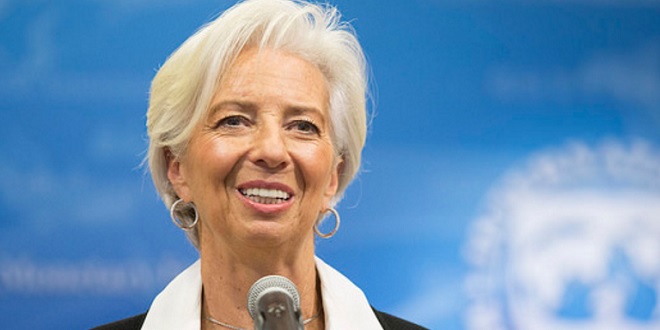
Washington, United States | AFP | With US-China frictions hanging over its annual meeting, the International Monetary Fund on Thursday warned governments to avoid harming trade and investment which have been key drivers of the global economic recovery.
IMF chief Christine Lagarde said escalating trade tensions could reverberate through the world economy, undermining confidence and choking off investment, and she urged the sides to resolve their disputes through dialogue.
“Investment and trade are two key engines that are finally picking up. We don’t want to damage that,” she said at a press briefing to open the spring meetings of the IMF and World Bank.
In its latest World Economic Outlook this week, the IMF listed the trade tensions as a key downside risk to the otherwise encouraging global recovery and warned they could harm the poorest the most through rising prices.
The outlook cites growing trade volumes and solid investment as driving the uptick in global growth to 3.9 percent this year and next.
US President Donald Trump last month imposed steep tariffs on steel and aluminum imports and threatened to impose more on tens of billions of dollars in Chinese imports, prompting Beijing to slap duties on US goods like pork and sorghum and to threaten even more sensitive US exports like soybeans.
Finance officials from member governments this week during the Washington meetings — which end Saturday — will discuss the trade disputes that Lagarde said threatened to cause damage beyond the two countries involved, due to the interconnected nature of global supply chains.
While she acknowledged “the actual impact of growth is not very substantial when you measure in terms of GDP,” she said the dispute could erode business confidence very quickly because of the uncertainty, which would make businesses “reluctant to invest.”
International cooperation “has served us so well and delivered more progress for more people than at any time in history,” but is now being questioned, Lagarde said.
– ‘Steer clear’ of protectionism –
While she welcomed bilateral discussions between Washington and Beijing, she said disagreements should be resolved in a multilateral forum and every country should address its own trade barriers.
Lagarde again urged countries to “steer clear of all protectionism,” saying that “unilateral trade restrictions have not proven helpful.”
Instead, “countries should work together to resolve disagreements without using exceptional measures.”
EU Economic Affairs Commissioner Pierre Moscovici expressed optimism that US officials were coming around on resolving the trade issues.
“My feeling is that, little by little, the consciousness of the damage a trade war could do will be apparent and dialogue will resume,” he told AFP.
“I hope that these IMF meetings will be marked by this spirit. On the American side, it seems to me that the climate is more receptive to the idea that protectionism is not the answer.”
Even with the implied critique of Trump’s tactics, Lagarde praised the massive US corporate tax reform which the Fund “advocated, recommended, encouraged, and is very pleased to see happening.”
Lowering the tax rate to match the average of other major economies would encourage investment, she said.
But at the same time, she urged the US to take advantage of good economic times to reduce its debt and deficits, rather than increase them.
Debt levels worldwide have hit a record $164 trillion, two-thirds of which is held by the private sector, while public debt in advanced economies is higher than at any time since World War II, according to the IMF.
Lagarde cautioned that rising debt in developing countries could create “unsustainable debt burdens” should financing conditions shift.
She praised the trade reforms recently offered by China’s President Xi Jinping — including lower tariffs on US cars, reducing investment restrictions and protections for intellectual property — which she said were “going in right direction.”
But it will be the implementation that matters, she said.
 The Independent Uganda: You get the Truth we Pay the Price
The Independent Uganda: You get the Truth we Pay the Price



